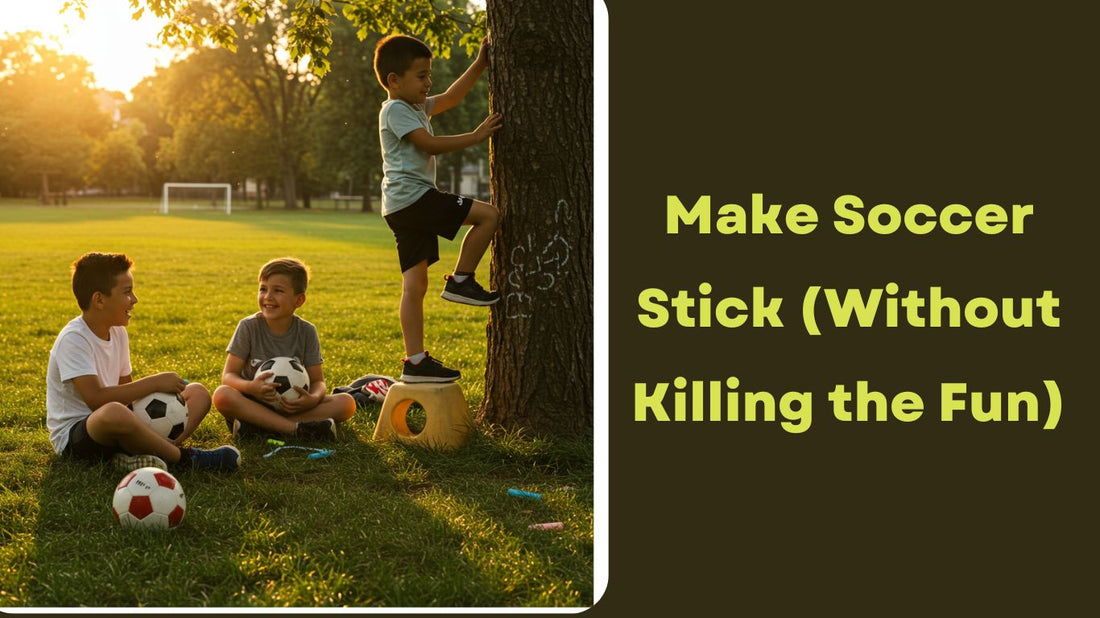As a youth soccer coach with over a decade of experience working with kids, I can tell you one thing for certain: keeping a 7-year-old interested in soccer isn't about tactics, drills, or trophies. It's about joy.
If you're reading this, chances are you've seen your child go from kicking the ball with excitement to suddenly dragging their cleats to practice. One week they're pretending to be Messi in the backyard; the next, they want to stay home and play Minecraft. You're not alone. This is a common—and completely normal—phase in a child's development.
Understanding the 7-Year-Old Mindset
At age 7, children are naturally curious, easily distracted, and still figuring out what they enjoy. Their attention span is short, and their passions can change as quickly as their favorite cartoon characters.
That means losing interest in soccer doesn't necessarily mean they hate it. It might just mean they need a reset.

Joy First, Always
The most important lesson I've learned as a coach and a parent is this: if it stops being fun, it stops working.
At this age, kids don't care about tactics. They care about fun. About laughter. About feeling good at something. So, how do we keep that spark alive?
1. Play With Them
Want your kid to love soccer? Grab a ball and go outside.
Forget the cones, forget the drills. Just you, your child, and the ball. Make up silly games. Play 1v1. See how many toe-touches you can do before someone falls over laughing. That connection is more valuable than any training session.
As one parent put it in a forum I recently read, "Just play with him. Kick the ball around, make up games, have fun."
2. Make Soccer a Shared Experience
Children are heavily influenced by what they see and feel around them. If you watch soccer games together, celebrate goals, or cheer for a favorite team, you create emotional bonds tied to the sport.
Whether it's watching the Women's World Cup or collecting trading cards, these rituals make soccer more than just "practice"—they make it personal.
3. Mix Structured and Unstructured Play
There's a time and place for practice. But not every soccer experience has to come with a whistle and a warm-up. Let them kick around with neighborhood kids. Organize pickup games at the park (even if it means you bring the ball and start the first round).
Remember, kids don’t need perfect fields or uniforms to fall in love with the game.

4. Let Friends Be the Hook
Many kids continue playing soccer not because they love the sport, but because they love the people they play it with.
If your child has close friends on the team or neighborhood buddies who play, their motivation will naturally rise. Soccer becomes social. It becomes belonging.
If they’re struggling with team chemistry, maybe it’s time to find a better team fit or explore another local league.
5. Try Other Activities Too
Here’s a radical idea for some parents: it’s okay to try other sports.
Rotating between sports like basketball, swimming, or even martial arts helps kids develop all-around athleticism and prevents burnout. More importantly, it lets them figure out what they truly enjoy.
And if they choose soccer again after trying something else? That choice comes from within, not from pressure.
6. Avoid Pressure, Even Subtle Ones
As parents, we often don’t realize how our expectations leak into our words and tone. Comments like "You weren't trying today" or "You used to be so much better" come from a place of concern but can crush confidence.
Instead, ask open-ended questions: "Did you have fun today?" or "What was your favorite part of practice?"
Celebrate effort over outcome. Joy over results.

7. Watch for Burnout Signs
A kid who once loved the game but now resists going to practice, seems tired all the time, or complains of vague injuries may not be lazy. They might be burning out.
That’s your cue to back off. Let them rest. Take a season off if needed. Passion is a flame—if you smother it, it dies. If you shield it gently, it will glow again.
8. Set the Right Environment
You don’t need private coaches or elite programs at age 7. What you need is a safe, supportive environment.
Equip them with good gear that makes them feel confident—like Kickaroo’s youth soccer grip socks and protective shin guards. The right equipment can boost comfort and prevent distractions from discomfort or injury.
A confident kid is a happy player.
9. Let Soccer Be A Thing, Not The Thing
Your child is not "just a soccer player."
They are a builder, an artist, a climber of trees, a dreamer, a giggler. Let them explore all of it.
Soccer can be a wonderful thread in the tapestry of their life. But it shouldn't be the entire fabric.

It’s About Joy, Not Judgment
If you take away one thing from this blog, let it be this:
Soccer is not the goal. Joy, confidence, and movement are.
Whether your child becomes the next big star or just kicks the ball around with friends on weekends, what matters is that they learn to love the game on their terms.
And if you're looking to support that love, make sure they're stepping onto the field prepared and protected. Kickaroo's youth soccer grip socks and shin guards are trusted by parents who value performance, comfort, and safety in every game and practice.
Because when the gear fits, the fun flows.
Explore Kickaroo's collection today and help your soccer star fall in love with the game again—one joyful kick at a time.

